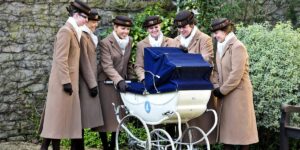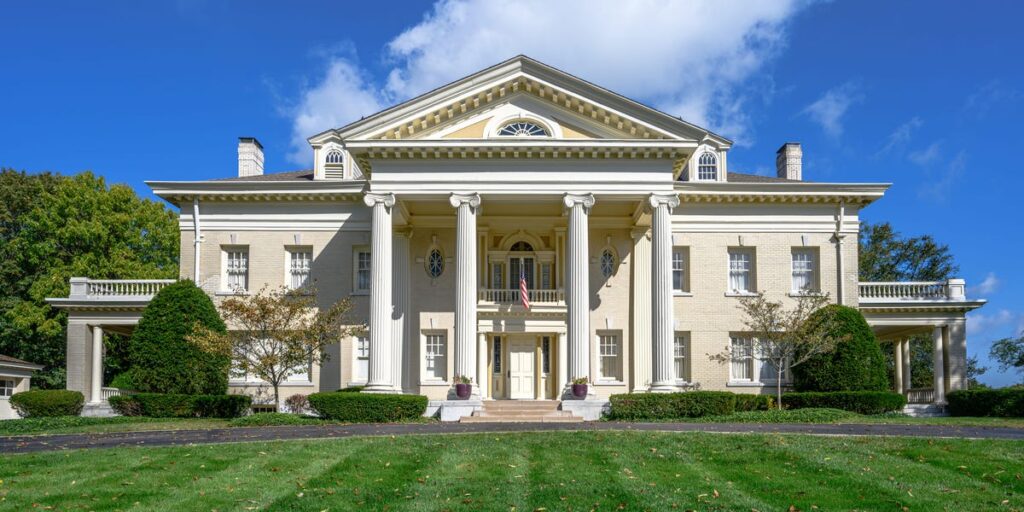X
Bluesky
Copy link
Impact Link
Save
Saved
Read in app
subscribers. Become an Insider
and start reading now.
Have an account? .
- Orville Wright, one of the Wright brothers, built a mansion called Hawthorn Hill near Dayton, Ohio.
- The inventor and reclusive millionaire lived at Hawthorn Hill with his father and sister.
- Orville Wright hosted celebrities, presidents, and family members at the home, completed in 1914.
Orville Wright was a fiercely private person.
Despite his fame as one of the Wright brothers, inventors of the world’s first piloted airplane, he often refused to make speeches or public appearances. Only a few recordings of his voice exist.
Hawthorn Hill, his 6,200-square-foot “success mansion” built just outside Dayton, Ohio, was a rare setting where he felt fully at home.
The Georgian Revival-style estate was his oasis. When the extended Wright family gathered there for holiday dinners, he was even known to play some practical jokes.
Now a museum open to the public, Hawthorn Hill preserves an intimate look into Orville Wright’s world and his contributions to the world of modern aviation. It was just 66 years after the Wright brothers’ first flight in 1903 that Apollo 11 landed on the moon in 1969.
I visited Orville Wright’s historic residence in August. Take a look inside Hawthorn Hill.
Orville Wright was the younger of the Wright brothers, the aeronautical engineers who invented the world’s first piloted airplane.
The Wright brothers worked as bicycle mechanics in Dayton, Ohio, before becoming known as the fathers of modern aviation. In 1903, they became the first people to pilot an aircraft when their Wright Flyer, made of wood and fabric sewn on the family sewing machine, flew for 12 seconds on the shores of Kitty Hawk, North Carolina.
Numerous patents and aircraft later, Orville Wright’s net worth was around $1.3 million when he died in 1948, which would be about $17.4 million in 2025 when adjusted for inflation.
One of their original flying machines, the 1905 Wright Flyer III, is on display at the Wright Brothers National Museum in Dayton, Ohio.
The 1905 Wright Flyer III was the first airplane that could take off, remain in the air while being controlled by a pilot, and land safely without damage. It is also the first airplane to be designated a National Historic Landmark.
The mansion is now a museum open to the public with tours offered through Dayton History.
After Orville Wright’s death in 1948, National Cash Register purchased the home and used it as a corporate guest house. The company then gifted the estate to the Wright Family Foundation in 2006. Dayton History took ownership of Hawthorn Hill in 2013 and has worked to restore the home to its original, historic appearance.
Tours of Hawthorn Hill are offered on Wednesdays and Saturdays at 10 a.m. and 12:30 p.m. Tickets cost $16 per person and are available through Dayton History.
Tours of Hawthorn Hill begin at Carillon Historical Park, a 65-acre campus dedicated to the history of Dayton, Ohio.
A shuttle transports visitors from Carillon Historical Park to the mansion, located just under 3 miles away in the suburb of Oakwood.
During Dayton’s booming industrial years in the 1920s, when over 1,000 manufacturing facilities were established within the city’s limits, the suburb of Oakwood became a hot spot for wealthy industrialists to build expansive mansions.
The first stop inside Hawthorn Hill was the entrance hall, which featured original furnishings from the Wrights’ time living there.
Unlike other wealthy business tycoons who hired interior decorators, Orville Wright and his sister, Katharine Wright, picked out all of the furniture themselves. They bought most of it in Grand Rapids, Michigan, from Berkey and Gay Furniture Company and Century Furniture Company showrooms.
“The sofa, the two chairs, that mirror, that table, are all pieces that if he were to walk through the door today, he would recognize,” Heckman said of the entryway.
Orville Wright greeted his important guests in the reception room.
Famous guests at Hawthorn Hill included Charles Lindbergh, Henry Ford, Alexander Graham Bell, Thomas Edison, and President Franklin D. Roosevelt.
The reception room featured a bronze statue called La Muse de L’Aviation, or The Muse of Aviation.
Created by Louis-Albert Carvin in 1908, the piece shows Wilbur and Orville Wright beneath a winged muse who points to an eagle in flight. The base of the statue depicts biplane wings and propellers.
“The idea was that the airplane was this new foundation, the airplane was the underpinning of it all,” Heckman said.
The living room was the largest room in the house.
Two of Orville Wright’s nieces held their weddings at Hawthorn Hill, with their ceremonies taking place in front of the fireplace mantle in the living room.
Orville Wright’s library and study was located off the living room.
He would often use this room to read or listen to the radio.
The room was full of his engineering projects, such as a chair and footrest he altered to help with his back and leg pain.
Orville Wright broke his leg in a plane crash in 1908. As a result, one leg was about an inch shorter than the other. To alleviate some of his pain, he drilled holes in the arms of a chair to mount a bookstand he could use instead of holding a book open. He also angled the footrest away from the seat cushion to take the pressure off his lower back and legs.
Orville Wright was an avid reader, with over 500 books in his library.
The clock on the bookshelf was set to 10:40, his time of death in 1948.
Heckman showed me how the books in his library were later stamped by the executors of his estate.
The stamp read “From the private library of Orville Wright” with an image of a plane.
The dining room hosted many Wright family gatherings over the years on holidays like Thanksgiving and Christmas.
Orville Wright was known for being painfully shy, but he also enjoyed a good practical joke in the comfort of his own home, Heckman said. He once hooked up a fishing line to a serving bowl of mashed potatoes to playfully prevent a greedy nephew from taking more than his fair share. Another time, he built a mechanical cockroach to dart across the Thanksgiving dinner table, causing pandemonium.
The kitchen has not yet been restored to its original historic appearance.
After the National Cash Register purchased Hawthorn Hill to use as a corporate guest house, the company renovated many of its rooms, including the kitchen. The white-painted cabinets and appliances are from the 1980s, but Dayton History plans to eventually restore the space to the way it looked when Orville Wright lived there.
The tour continued upstairs in Orville Wright’s father’s bedroom.
Bishop Milton Wright died in his sleep in his bedroom in 1917 at the age of 88. His funeral was held at Hawthorn Hill.
This guest bedroom was once known as the Rose Room for its previous rose and champagne-colored furnishings.
The room’s vanity and the chest of drawers were the only two pieces of furniture that the Wrights brought to Hawthorn Hill from their home in West Dayton.
“That was at the urging of Katharine Wright, because she paid for both of these herself from her salary as a school teacher, and she insisted that these two pieces came to the new house,” Heckman said.
The Blue Room was supposed to be Wilbur Wright’s bedroom, but he died before the home was completed.
Instead, it functioned as another guest room.
Katharine Wright lived at Hawthorn Hill until her marriage at age 52 to journalist Henry J. Haskell in 1926.
Katharine Wright became a celebrity in her own right while serving as Orville Wright’s business and household manager, secretary, confidant, and plus-one at high-profile gatherings.
Her marriage caused a deep rift in her relationship with her brother, who felt that she was abandoning him. Orville Wright refused to allow the couple to wed at Hawthorn Hill, and the two remained estranged for the rest of their lives.
Katharine Wright died of pneumonia in 1929. By the time Orville Wright arrived at her deathbed, she was already unconscious. Her funeral, however, was held at Hawthorn Hill.
Her room also featured a jute balcony where Charles Lindbergh famously appeared while visiting Hawthorn Hill in 1927.
In 1927, Wright hosted Charles Lindbergh, the first man to fly across the Atlantic, in what was supposed to be a private visit without any public appearances. However, as word spread that “Lucky Lindy” had arrived at Hawthorn Hill, crowds gathered outside the house.
“Orville, being so shy and reserved, isn’t the kind to go outside and shake a thousand hands and send people on their way,” Heckman said.
An archival photo of Hawthorn Hill shows an enthusiastic crowd waving up at Lindbergh as Orville Wright hid from view.
Orville Wright, who did his best to avoid publicity and appearing in front of crowds, begged Lindbergh to do something to make his admirers disperse. Lindbergh ended up stepping out onto the balcony of Hawthorn Hill to wave to the crowd.
The final stop on the Hawthorn Hill tour was Orville Wright’s bedroom.
His bedroom still featured his original mattress and a painting of an airplane.
“When he’d wake up in the morning, one of the first things he would see would be his place in history right across from his bed,” Heckman said.
Heckman added one more stop that isn’t usually on scheduled tours of Hawthorn Hill: the rooftop.
Up in the attic, I climbed a steep set of wooden stairs that led to the roof.
The elevated lookout point provided views of Dayton and nearby Oakwood estates of other local business tycoons. Orville Wright’s neighbors included Elmer Biechler, president and general manager of Frigidaire, and Joseph Green, the inventor of Cheez-It crackers.
Hawthorn Hill offers a glimpse into Dayton’s long history as a center of innovation — and a side of Orville Wright that the world rarely saw.
“Our hope is that you can go to a lot of places in the Dayton area and elsewhere around the country to learn about the engineering marvel of the airplane and how the Wright brothers invented the airplane. Here, you’re walking through his home,” Heckman said. “We’re trying to express to people what he would have been like if he had been your uncle, your neighbor, your cousin, a friend.”
Read the full article here
















